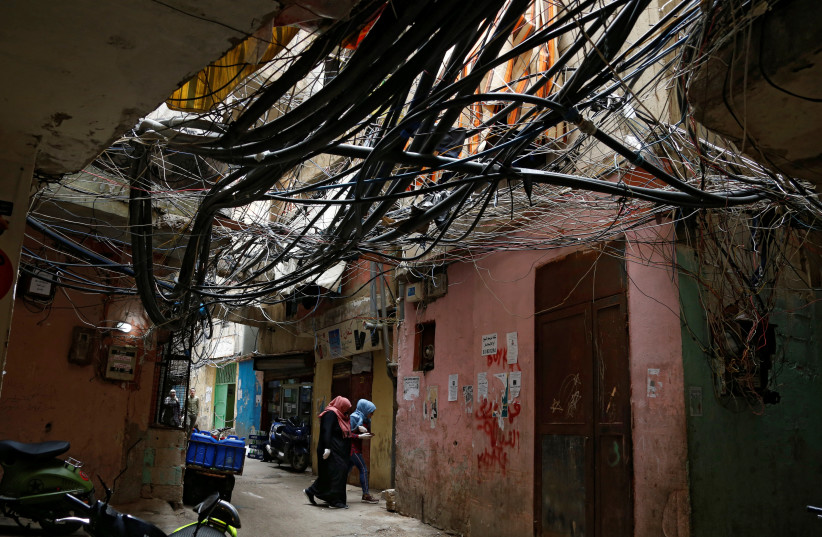by Tzvi Joffre
The labor minister had decided in December to allow Palestinians to work in previously barred professions.
Lebanon's State Shura Council decided this month to reverse an order issued in December allowing Palestinian refugees to work in trade-union regulated professions, after complaints that the order would encroach on the rights of Lebanese professionals and claims that the order was trying to pave the way for naturalizing Palestinian refugees.
The reversal was made after the council accepted an appeal by the Maronite League, the head of the league, Neamatallah Abi Nasr, announced on Thursday, according to Lebanon's National News Agency (NNA).
In December, amended regulations published by the country's Labor Ministry stated that Palestinians who were born in Lebanon and officially registered in the records of the Lebanese Interior Ministry will be allowed to work in professions that are in general limited to Lebanese citizens only, such as law, engineering and medicine, among others.
The appeal filed by the Maronite League claimed that the labor minister had overstepped his authority when he issued a decision allowing Palestinians to access previously barred professions. The appeal had claimed that the decision violated the country's constitution, adding that the league was blocking attempts to "change the modern and historic face of Lebanon and attempting to impose a new demographic status quo," according to L'Orient Le'Jour.
The Hamas movement in Lebanon condemned the decision to reverse the order on Saturday, saying that it "raises fundamental questions related to its background and timing, and harms Lebanese-Palestinian relations.”
 Women walk under electricity cables in Shatila Palestinian refugee
camp, as the spread of coronavirus disease (COVID-19) continues, in
Beirut suburbs, Lebanon March 30, 2020 (credit: MOHAMED AZAKIR/REUTERS)
Women walk under electricity cables in Shatila Palestinian refugee
camp, as the spread of coronavirus disease (COVID-19) continues, in
Beirut suburbs, Lebanon March 30, 2020 (credit: MOHAMED AZAKIR/REUTERS)The movement stressed that the order which had allowed Palestinians to work in previously barred professions was "commendable" and that it would not lead to Palestinians settling in Lebanon.
Opponents of the Maronite League's appeal asserted that the labor minister did not change a law by opening up previously barred professions and had simply reversed previous orders issued by former labor ministers.
The National Federation of Employees' and Workers' Unions in Lebanon (FENASOL) announced on Saturday that it would not comply with the reversal of the order and would keep allowing Palestinian refugees to work in the affected professions, according to NNA.
"How can a former president of the Maronite League have the right to appeal the decision regarding the livelihood of the besieged in the camps and suffering from hunger, impoverishment and unemployment?" questioned FENASOL. The federation called on all the unions and human rights organizations to reject the decision and submit an appeal against it.
About 180,000 Palestinian refugees live in Lebanon, according to the United Nations Relief and Works Agency for Palestine Refugees (UNRWA). Palestinian refugees in Lebanon suffer from widespread poverty and an extreme lack of rights. They cannot obtain citizenship.
Palestinian refugees in Lebanon find it extremely difficult to obtain annual work permits that they are required to obtain and often work for lower pay than their Lebanese colleagues. As the economic crisis in Lebanon continues to worsen, UNRWA recorded a significant increase in arbitrary dismissals and absence of end-of-service compensation as many employers do not adhere to the labor rights of Palestinian refugees, according to a brief published in September 2020.
While Palestinian refugees have to pay into the National Social Security Fund, they are largely unable to access the benefits of the fund offered to Lebanese citizens.
Nearly half of all Palestinian refugees in Lebanon live in overcrowded, unsanitary refugee camps. The camps are also plagued by crime and violence, with limited enforcement by Lebanese authorities. Palestinian refugees are prevented from legally acquiring real estate in Lebanon.
Tzvi Joffre
Source: https://www.jpost.com/middle-east/article-696289
No comments:
Post a Comment